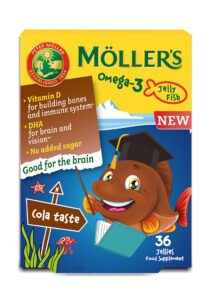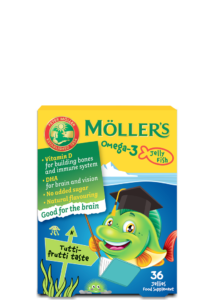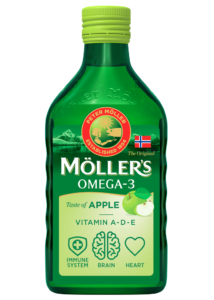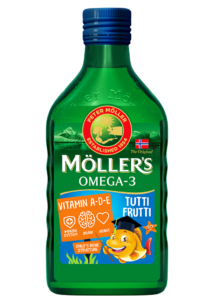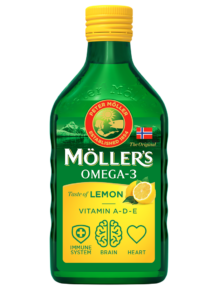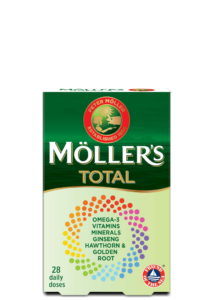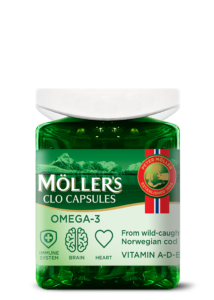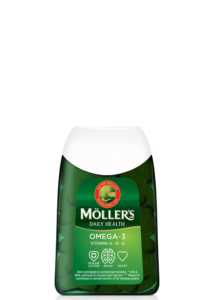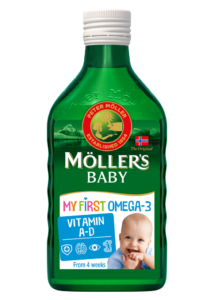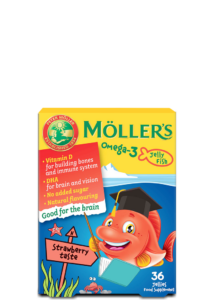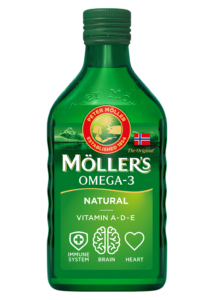A mother’s milk contains protein, fat, carbohydrates and other important nutrients a baby needs, but it doesn’t cover the daily intake of vitamin D for 0-2 year olds recommended by the British Health Department.
Home » Vitamin D for your baby’s development
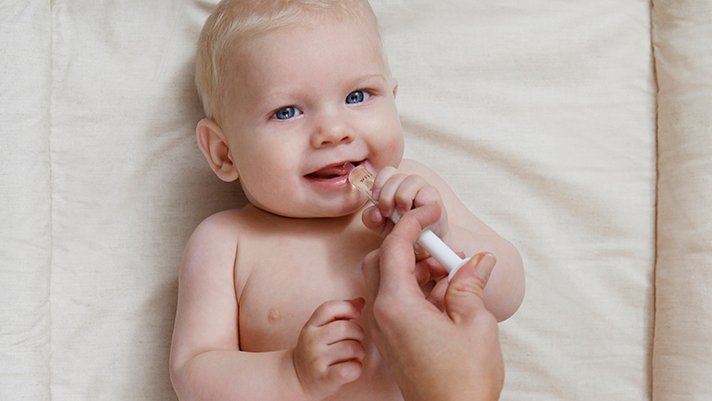
Vitamin D for babies and toddlers
The Health Department recommends breast milk as the only source of food during a baby’s first six months of life. Hence, it’s not possible to include foods rich in vitamin D, such as oily fish or fish liver, in your baby’s diet.
So, if you are breastfeeding, the Health Department recommends you give your baby a daily supplement containing 8.5 to 10 micrograms (µg) of vitamin D, up to the age of one. This is regardless of whether you are taking a vitamin D supplement yourself.
Infants aged 1 to 4 years old should be given a daily supplement containing 10µg of vitamin D.
Read more about vitamins and minerals here
Cod liver oil for baby
Möller’s has made its own product for babies between 0 and 2 available in chemists. This is an exclusive custom-made form of CLO for babies, with an adapted amount of vitamin D and vitamin A. Additionally, this natural supplement contains healthy amounts of omega-3 fatty acids, which are beneficial for baby.
A bottle of Möller’s Pharma My First Cod Liver Oil contains a total of 50 daily doses of 5 milliliters. One daily dose also provides 10 micrograms of vitamin D, based on the recommendations from the Health Department. It is recommended that you give your baby CLO as soon as four weeks after birth, but only 2.5 ml daily, then gradually increase to 5 ml during the first six months after birth. It’s easy to measure the correct dose and feed it to baby with the clever dosing syringe that comes with Möller’s Pharma My First Cod Liver Oil.
Cod Liver Oil or Vitamin D drops for baby?
In Norway, where Möller’s Cod Liver Oil is made, clinic doctor Randi Kasin advises all parents to give CLO to their baby, rather than vitamin D drops, during the six-week check-up.
“Vitamin D drops don’t contain the healthy omega-3 fatty acids and I think these are important to give baby. Another benefit of CLO compared to vitamin D drops is that it’s cheaper,” says Kasin.
Follow the link below to read more about her thoughts on CLO, omega-3, vitamin D and your baby’s needs.
What is good health?
Do you have a good lifestyle?
Lifestyle simply means the way in which you live. Health and lifestyle go hand in hand. You might feel you have a good lifestyle if you are physically active, eat healthily and generally experience a sense of wellbeing. Conversely, if you want good health you should also have a good lifestyle.
Physical activity is the major contributor to a good lifestyle, but diet, drugs, stress, sleep and social conditions are also play an important role. Being able to use the body properly to avoid injury also affects lifestyle. Physical activity can also prevent depression and help you to recover more quickly from mental illness, both of which obviously affect your lifestyle.
Diet can be a difficult topic for many. Perhaps you eat too much or too little or maybe you find it hard to know what foods to combine to have a balanced diet. It’s also important to eat food that contains important vitamins, minerals and dietary fibre, omega-3 and antioxidants. On top of all this, you also need to get enough energy, protein and the correct fatty acids. The requirement for these nutrients changes throughout your life. When you are older you also have different requirements than children and younger adults. Women also have different requirements than men. Pregnant and breastfeeding mothers also have special requirements.
When you get older, you lose muscle mass and your body requires less energy and therefore less food. You may lead a less active life than you did before, which is why you require less food. However, your need for minerals, vitamins and other nutrients remains the same. Of course, there are plenty of healthy and active older people, but when you reach 70 to 80 years of age, it’s easier to become ill, especially during flu season.
Some steps you can take to improve your lifestyle and health are to:
- eat a healthy and varied diet
- stay active
- watch your weight
- avoid too much alcohol and don’t smoke
- get enough sleep
- think positive
- practise good hygiene
What is good quality of life?
The World Health Organisation (WHO) defines quality of life as a state where the individual can realise their potential, cope with normal stressful situations, work in a rewarding and positive way, and be able to contribute to others and society.
Quality of life is a wide and somewhat diffuse concept that includes joy in, and a desire for, life. These are values that are rather felt than measured, which in turn are based on personal environment and choices. Quality of life doesn’t necessarily depend on being healthy or sick. It’s the moments between worries, sorrows, problems and ailments that matter. For example, if you have a chronic illness, a feeling of mastery can be important when talking about quality of life.
To sum up, quality of life is a combination of health, lifestyle, networks and social support. It’s about experiencing joy, meaning in life, satisfaction, security and a sense of belonging, as well as being able to use your strengths. It’s also about feeling interest in life, coping with everyday situations and a being committed to something or someone. If you have good quality of life, you will be able to cope better with the inevitable stressful situations in life.
Our products
-
Möller’s Omega-3 Jelly Fish Cola
-
Möller's Omega-3 Jelly Fish Tutti Frutti
-
Möller’s Cod Liver Oil Apple
-
Möller’s Cod Liver Oil Tutti Frutti
-
Möller’s Cod Liver Oil Lemon
-
Möller's Total
-
Möller's Cod liver oil capsules
-
Möller’s Daily Health
-
Möller's My First Omega-3
-
Möller’s Omega-3 Jelly Fish Strawberry
-
Möller’s Cod Liver Oil Natural
Learn more
Exercise program for the elderly
Healthy Aging Healthy Bones
Healthy diet during pregnancy
Brain Healthy Aging
Good health, lifestyle and quality of life – What does it all mean?
Cod Liver Oil Healthy Aging
Get inspiration on our Instagram
This error message is only visible to WordPress admins
There has been a problem with your Instagram Feed.
